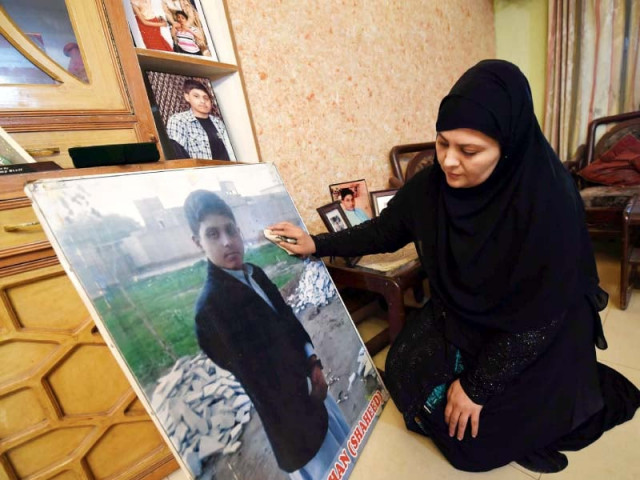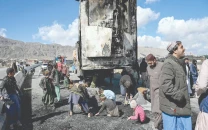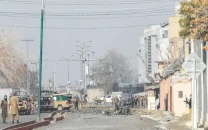Military trial: ‘No forgiveness’ as four APS attack convicts executed
The terrorists were convicted of harbouring bombers, raising funds

An APS attack victim’s mother gazes at his photograph at her house in Peshawar. PHOTO: AFP
Four abettors of last year’s deadly rampage at a military-run school in Peshawar were hanged to death in the Kohat Central Jail in early hours of Wednesday with parents of victims saying the terrorists deserved ‘no forgiveness’.
Terrorists had methodically killed more than 150 pupils and staff at the Army Public School (APS) on December 16, 2014. The outlawed Tehreek-e-Taliban Pakistan had claimed responsibility for the massacre. Following the attack, the government lifted a moratorium on the death penalty and chalked out a National Action Plan under which military courts were set up across the country to try hardcore terrorists.
The terrorists hanged on Wednesday have been identified as Maulvi Abdus Salam, Hazrat Ali, Mujeebur Rehman and Sabeel alias Yahya.
They were convicted and condemned to death by a military court on August 13. Their two accomplices – Taj Muhammad, alias Rizwan, and Ateequr Rehman, alias Usman – and another terrorist, Muhammad Farhan, alias Ali, were convicted by the same court.
The terrorists were executed after army chief General Raheel Sharif signed their black warrants on Monday. President Mamnoon Hussain had rejected their clemency appeals on the advice of Prime Minister Nawaz Sharif on November 20.
The executions were announced by the military’s media wing – the Inter Services Public Relations (ISPR) – Wednesday morning. The convicts were allowed to see their close relatives on Tuesday. According to the ISPR, Hazrat Ali was involved in a number of terrorist activities, including attacks on law-enforcement agencies, abetting kidnappings and killings of Levies soldiers. He also raised funds for the APS attack.
Mujeebur Rehman was involved in transporting 10 suicide bombers for an attack on a PAF base in Peshawar. He was an active militant involved in sabotage activities, including targeting the law-enforcement agencies and abetting attack on the APS.
Sabeel alisas Yahya was also involved in the attack on the PAF base in Peshawar. He had also abetted in the attack on the APS while Maulvi Abdus Salam had harboured the APS attackers.
Survivors of the APS massacre said they were happy to hear of the executions. But fathers of the victims who gathered in Peshawar on Wednesday said the hangings should have been carried out in public squares.
“The nation wanted to see these animals hanged publicly so others would not dare follow their example,” said Abid Raza Bangash, an engineer whose 15-year-old son Rafique Raza Bangash was killed.
“The rest should be caught too, no one should be spared,” survivor Waheed Anjum, 18, told AFP. Anjum, who was 17 at the time of the attack, was struck by three bullets, one in each arm and one in his chest.
“They shouldn’t have been hanged from prisons, they should have been hanged from squares,” his father Momin Khan Khattak added. “There is no forgiveness in our hearts after what they did to our children.”
Some 20 fathers gathered for an emotional meeting in Peshawar on Wednesday, with several in tears and many angrily echoing the call for the gunmen to have been hanged in public. Parents of the Peshawar victims meet regularly, and Wednesday’s gathering had been scheduled before news of the hangings broke.
Other parents told AFP the executions would deter future attacks.
“The parents of the schoolchildren have long been demanding that the terrorists be severely punished, and today we are satisfied our demands have been met,” said Ajoon Khan, who lost his only son. “The hangings won’t bring back my son, but now other people’s sons will be kept safer,” said Tufail Ahmed Khan, who lost one son while another was wounded.
Published in The Express Tribune, December 3rd, 2015.



















COMMENTS
Comments are moderated and generally will be posted if they are on-topic and not abusive.
For more information, please see our Comments FAQ